
Screenshot via Local 10

Audio By Carbonatix
Last summer, Hollywood resident Dwight Turner paid $150 to visit an animal sanctuary for a “full contact” experience with a black leopard. Turner wanted to go inside the leopard’s enclosure, play with the big cat, rub its belly, and take pictures. Instead, the leopard mauled Turner, tearing his right ear in half and leaving a piece of his scalp hanging from his head.
Turner’s injuries required 22 staples and two surgeries. The wounds became infected, and after being discharged from a hospital, he required two weeks of home healthcare to monitor the infection and injuries, according to Florida Fish and Wildlife Conservation Commission records obtained by National Geographic last year.
In October, the owner of the Broward County animal sanctuary, Michael Poggi, was charged with two wildlife violations: maintaining captive wildlife in unsafe or unsanitary condition, or in a manner that results in threats to public safety; and permitting a Class I cat to come into physical contact with the public. He pleaded guilty to both charges last month and was sentenced to six months’ probation.
Now that Poggi’s case is resolved and he was adjudicated guilty, People for the Ethical Treatment of Animals is calling on the U.S. Department of Agriculture to revoke his federal Animal Welfare Act license, which allows him to exhibit and sell certain warm-blooded species of animals. In a letter to the USDA this week, PETA’s associate director of captive-animal law enforcement, Michelle Sinnott, said Poggi’s actions violated state and federal law related to animal ownership and welfare, which is grounds for the revocation of his license.
Sinnott argues that Poggi violated the federal Animal Welfare Act, in addition to state law. She wrote that the USDA considers adult big cats dangerous and that the animal welfare law’s handling regulations prohibit “direct public contact” with the animals.
Sinnott says Turner was lucky to survive the attack.
“Any big cat expert knows that entering a cage with a powerful predator is a recipe for disaster, and that’s exactly what happened here,” Sinnott tells New Times. “Leopards are strong, agile predators with strong claws and teeth, which makes them more than capable of killing a human being. There’s no reason for someone to allow a person to enter a leopard enclosure. It’s illegal under Florida state law, and it’s also prohibited under federal law.”
Poggi, who lives in Davie, owns and operates Poggi’s Animal House, which he calls an exotic animal sanctuary. Sinnott calls him a notorious backyard monkey breeder who runs a fake sanctuary.
“He sells primates for the pet trade from the back of his house in a residential neighborhood,” she says. “It’s not surprising that someone with a reputation for being a seedy, sham sanctuary operator and breeder would allow this [leopard encounter] just to make a quick buck.”
Poggi did not respond to New Times’ requests for comment via phone, email, or his lawyer.
Poggi’s website advertises baby marmosets, tamarins, white-faced capuchins, and other small primates ranging in price from $6,900 to $15,900. Another business he owns, Exotic Animal Parties LLC, offers to supply exotic animals for birthdays and other special events. Poggi also offers animals “for rent” so people can try before they buy.
According to Poggi’s websites, the animals that dwell at his at-home “sanctuary” include exotic birds, a Siberian lynx, camels, iguanas, bunnies, goats, snakes, baby alpacas, lemurs, and a variety of primates.
Poggi has been on the Humane Society’s radar for years, the organization says.
“Records show that in 2014, Poggi sold a six-week-old marmoset monkey to a Massachusetts couple for $3,500. A year later, the monkey was confiscated by the Massachusetts Department of Fish and Game because keeping a pet monkey in the state is illegal,” a Humane Society blog post states.
According to the blog post, 540 “safety incidents” involving captive primates have been documented in the U.S. since 1990; half have been attributed to primates kept as pets. But the Humane Society argues that monkeys are not meant to be kept as pets. Zoonotic diseases can spread between them and humans. Monkeys can become “mentally disturbed” when kept in homes. And infant primates are separated too soon from their mothers when they are sold as pets.
Sinnott warns the public to stay away from Poggi’s facility and all roadside or backyard zoos. To find accredited animal sanctuaries, she suggests visiting the Global Federation of Animal Sanctuaries’ website.
“No reputable facility would have a leopard in the backyard of a house in a residential neighborhood, and no reputable facility would ever allow the public to have direct contact with an adult big cat,” Sinnott says. “Those are two immediate red flags.”